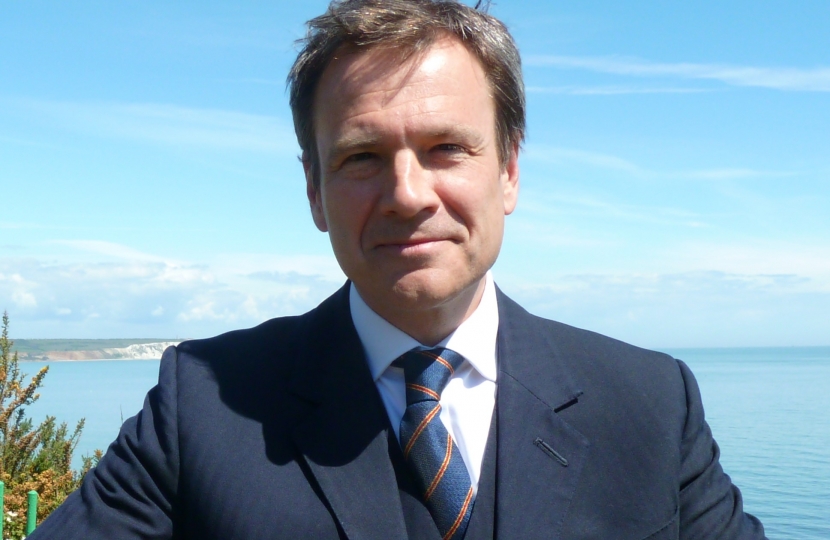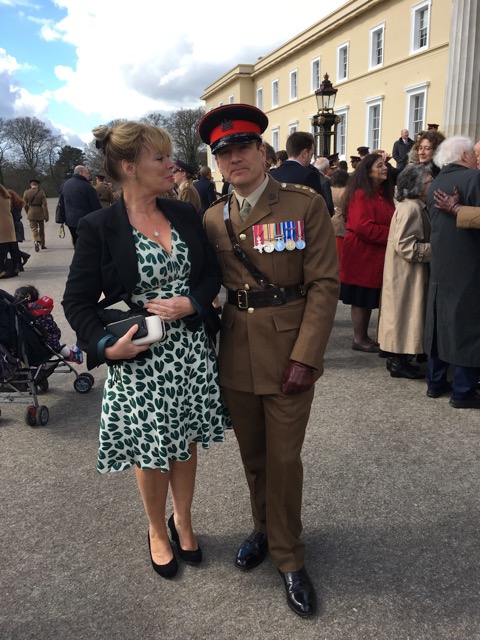
Bob was first elected as the Conservative MP for the Isle of Wight parliamentary constituency in June 2017. He was re-elected in December 2019, with the highest number of votes ever secured on the Isle of Wight by any candidate.
Bob lives near Brighstone, at the heart of the Island. He is the sixth generation of his family to be involved in community life on the Isle of Wight. He is committed to representing all Islanders, regardless of political affiliation, fighting for the interests of the community as a whole.
Bob is a former journalist and soldier. From 1990 to 1995, he worked as a foreign correspondent in the USSR/post-Soviet states. From 2008 to 2017, he served in the UK Armed Forces on the Iraq, Afghanistan, Libya and ISIS campaigns.
Bob has a PhD in International Security Studies from King’s College.
Bob’s career prior to becoming the Island’s MP
Bob worked as a foreign correspondent in eastern Europe for four years for The Times newspaper. He first visited the USSR in early 1990, witnessing the first celebrations of Easter in western Ukraine since Soviet occupation after World War II, and also the first Chernobyl disaster protests in Kiev that year. He filed an initial batch of reports and was invited by the newspaper to return permanently to the USSR / former USSR.
Between 1991 and 1995, Bob lived in Kyiv, and reported from many parts of the then USSR: Russia (including Moscow, European Russia and Siberia) Ukraine (including Crimea), Moldova, Georgia, Azerbaijan, Armenia (including Nagorno Karabakh), Uzbekistan and Tajikistan. He also made occasional visits to the Balkans, including Sarajevo and Kosovo. He also wrote occasional articles for The Spectator and The Sunday Times.
In the final year in the former USSR, Bob became a Special Correspondent for The Washington Post. He then spent a year in the USA writing a book, Deadly Embrace, on Russia’s role in the Caucasus. During this time, Bob was a fellow at Brown University’s Watson Institute. He returned to the UK to work for the Associated Press as a London-based reporter.
In 2000 Bob moved into politics for a short period. He headed up the foreign affairs team for Francis Maude. In 2005, he stood in the Broxtowe Parliamentary seat in the General Election but lost to the Labour candidate by 2,296 votes.
From 2005 to 2008 Bob worked for MTV Networks International.
Russia and Ukraine
Bob has written on the threat of Russian warfare, and for years warned of the threat of a new cold war.
In 1995, writing for the Wall Street Journal, Bob predicted of the decades ahead: “After a honeymoon period following the collapse of the Soviet Union, Europe now looks set for a new era of rivalry between coalitions of nations led by the United States and one led by the Russian Federation.”
In 2008, Bob criticised the UK Government’s policy recognising Kosovo. He argued: “It will harm our relationship with Russia, extending and worsening the new Cold War. It will diminish the prospects for stability and order in many parts of the world, not least in the Balkans as well as the arc of instability which rings the southern flank of Russia. It will result in a loss of credibility for Western diplomacy.” In the Kings College’s ‘Defence-in-Depth’ blog in 2016, Bob claimed “that Western states are now in a third cold war with Russia.”
In 2017, Bob, writing for the influential UK think tank, the Royal United Services Institute, argued that President Vladimir Putin’s objectives were: “to remould Russia in an illiberal and anti-Western way. He represents a virulent strain of Russian thought and identity that rejects, even despises, Western liberal thought.” He also predicted that Russian soldiers stationed in Crimea were “positioned as a precursor to further violence.” Writing in The Daily Telegraph in November 2021, Bob argued that: "In his final decade in power, Putin wants to do three things: first, destroy an independent Ukrainian state; second, shatter NATO and third, cement Russia’s role of an illiberal rival to the West. He will risk war.”
As of 2023, Bob chairs or co-chairs the All Party Parliamentary groups in Parliament on both Russia and Ukraine.
Military Career
From 2008 onwards, Bob served in the UK Armed Forces. He was mobilised or placed on Full Time Reserve Service (FTRS) for nearly a decade until his selection as a parliamentary candidate in the 2017 election, at which time he resigned his full-time service and returned to the Army Reserve.
Bob was initially mobilised in 2008, deploying to Iraq. He served out of Basra Airport. Over eight months (parts of Op TELIC 12 and 13), he deployed on over 20 operations during his tour, mainly focused on extended patrolling through the villages around the southern Basra marshes and parts of Basra city, meeting local village elders and providing atmospherics reporting for the UK Command. After his tour Bob was remobilised and asked to remain in the Armed Forces on full-time service. He deployed on four occasions to Afghanistan for tours of between one to four months. He was based out of Lashkar Gah, and Nad-e Ali. He also served on the Libya and ISIS campaigns.
Bob has also supported the development of UK military thinking in unconventional warfare.
Bob was awarded a Joint Commanders Commendation in 2009 and was decorated with a Military MBE in the 2016 Operational Awards and Honours List, which he received from the late Queen in early 2017.

Bob's Commissioning as a Captain at Sandhurst in early 2017
Academic, Defence and Foreign Policy Work
Bob has a PhD in International Security Studies from King’s College, London. The title of his thesis was: Uniting Ways of War for Perpetual Conflict, An Examination of Contemporary Russian Warfare.
He argued that modern Russian warfare – and modern conflict - should be interpreted as the unification of two ways of war, conventional military warfare with non-conventional forms of conflict. In the case of Russia this united the conventional war of the Red Army with the unconventional tactics of the KGB and the Communist Party. He argued that the Russo-Ukraine war has been ongoing for nearly twenty years and, thus far, in three phases. It began in 2004, using the tools of political, economic, espionage and informational warfare to subvert Ukraine’s political leadership. From 2014 onwards, the Kremlin additionally used violent political fronts and paramilitary groups to conduct a limited war in eastern Ukraine. From 2022, it attempted to rely on overwhelming military force for a third, largely conventional, phase.
His academic writing is available online. He is an occasional blogger on Russian / Ukrainian issues, hybrid war, unconventional and new forms of war. He has contributed to the King’s College War Studies blog, Oxford Politics Department blog, The Washington Post’s social sciences blog and the Journal of the Royal United Services Institute as well as The Telegraph, The Times and The Spectator.
Family Background
Bob is descended from a family involved in business, politics and soldiering. His family have come from the Isle of Wight and Nottinghamshire. He is the sixth member of his paternal family to become a Member of Parliament, the second to be MP for the Isle of Wight and the third to contest the Island since the 19th century. He is the first member of the family to be knowingly elected as a Conservative MP (a great, great uncle was elected under the Conservative banner whilst serving in the Boer War, but assumed he was standing as a Liberal due to the family’s political traditions).
The family had a reputation for radical liberalism. Charles Seely MP (1803-1887) was a Chartist supporter and Liberal republican MP (Lincoln) who Queen Victoria refused to talk to for a quarter of a century after Seely invited the Italian revolutionary Giuseppe Garibaldi to Britain. Another four family members were Liberal or Liberal Unionist MPs between the 1860s and 1950s. Two, Jack Seely and Hugh Seely, were government ministers in 20th Century Liberal and Coalition Governments. Jack had been MP for the Isle of Wight on two occasions, 1900-1906 and 1923-1924. As General Jack Seely, he led one of the last great cavalry charges in history at the Battle of Moreuil Wood on his horse Warrior in March 1918, preventing German forces from decoupling British and French armies. Jack Seely was a close friend of Winston Churchill and the only former Cabinet Minister to go to the front in 1914 and still be there four years later. Jack Seely’s book about his horse, Warrior, was a best-seller in 1934 and on its re-release in 2014.
The Seely family wealth was built on the agricultural revolution - milling in Lincoln - and afterwards the industrial revolution - coal in Nottinghamshire. The family were known for their philanthropic work, establishing schools in Nottinghamshire as well as recognising union representation in the family coal mines as far back as the late 19th century. On the Island, they established a library service and Reading Rooms, built housing for the rural poor and helped to establish a lifeboat service along the southwest coast of the Island. The family’s wealth was whittled away during the 20th century.
Bob was born in 1966 to Richard and Helga. He was educated at Arnold House School, and Harrow School.
The lives of both of his parents were shaped by World War II.
Bob's grandfather, Bill Seely, was killed leading his Artillery Regiment, the South Notts Hussars, during desperate fighting at the battle of Gazala in June 1942. On the morning of the Regiment’s destruction, 6 June, Seely’s Regiment had received the order to fight ‘to the last man and the last round’ to provide cover for retreating British forces. It succeeded, but at the cost of the destruction of the unit as a fighting force and the death of many of its men. Lt. Col. Seely himself was killed when his tank was pierced by a German shell, two hours before the Regiment’s positions were finally overrun.
Prior to his death, Lt. Col. Seely had been Mentioned in Despatches for gallantry, for leading his men in taking several thousand Italian prisoners.
For some time after, Richard - who was then a young teenager - lived in hope that his father had been taken prisoner. Richard later trained as a pianist, before becoming a government lawyer. He died in 2013.
Bob's German mother, Helga, was brought as a young girl up in Nazi Germany. Her family had moved to Krackow during the war where her father worked as a postman. Bob's maternal grandmother was killed at the end of the war, and his mother’s life was saved thanks to her father’s ability to speak Russian and serve as a translator for the invading Soviet forces. The family ended the war in a refugee camp in Dresden, and from there made their way to what became western Germany. Helga later moved to the United Kingdom. She passed away in 2015.
In his free time, Bob loves the outdoor spaces of the Island and enjoys exploring our footpaths, bridleways and beaches. He plays guitar badly. Bob is a keen swimmer and occasionally swims the Solent for charity.



